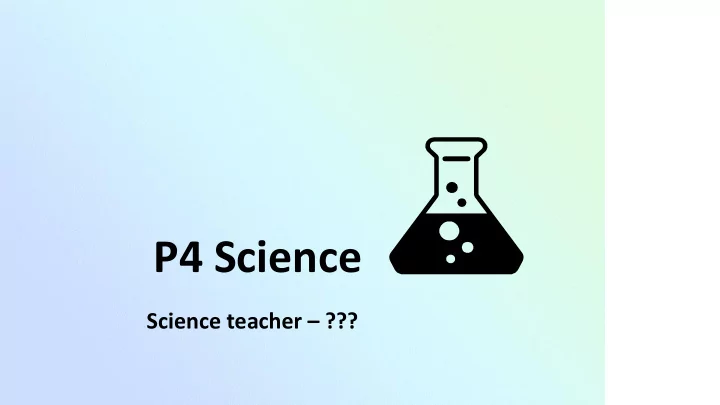

P4 Science Science teacher – ???
Content • Joy of Learning • Topical Coverage • P4 Level Focuses • P4 Key Strategies • Assessment Format • Home Support
Joy of Learning To provide opportunity for students to apply their knowledge and conceptual understanding , ask questions and solve problems through experiential learning. Students will go through the Ecotrail in term 4 • examine the life cycles of mealworm beetle and butterfly • observe the life stages of a mealworm beetle by rearing their own mealworms
Joy of Learning Experiential Learning through Learning Journey The NEWater Visitor Centre is an education hub that promotes water sustainability in Singapore and emphasises the importance of our 3rd National Tap. To appreciate the importance of conserving our water and understand the important role they can play.
Joy of Learning NEWater Scientist Programme @NEWater Visitor Centre The NEWater Visitor Centre is an education hub that promotes water sustainability in Singapore and emphasises the importance of our 3rd National Tap. The NWSP helps our students to • understand Singapore’s water challenges and solutions to achieve water sustainability, • increase understanding and appreciation of the science of water.
Joy of Learning Hands-on group experimentation • make observations and seek to make scientific sense • engage in scientific discussion and communication • deepen acquisition of concepts • improve procedural knowledge & scientific thinking – stating aims, variables, conclusions, interpretation of data & understanding of graphs • use of ICT tools such as iPads, temperature and light sensors
Topic Coverage THEMES LOWER BLOCK (P3 & P4) UPPER BLOCK (P5 & P6) DIVERSITY Diversity of living and non-living things Diversity of materials CYCLES (T1) Cycles in matter and water Cycles in water (water cycle) (matter) Cycles in plants and animals (reproduction) (T4) Cycles in plants and animals SYSTEMS Plant system Plant system (respiratory and circulatory Human system systems) (digestive) Human system (respiratory and circulatory system) Cell system Electrical system INTERACTIONS Interaction of forces (Magnets) Interaction of forces Interaction within the environment ENERGY (T2 & T3) Energy forms and uses Energy forms and uses (Light and Heat) (photosynthesis) Energy conversion
P4 Level Focus Making connections through process skills and conceptual understanding Building nature P6 of science P5 Enhancing scientific communication P4 P3 Arouse curiosity through exploration Building basic scientific literacy P1&2 Exposure to scientific world
P4 Level Focus In Primary 4, the students start to learn about physical science. They learn to understand the current science theories from experiments and hands-on sessions in the science labs. In the process, they understand that science theories and concepts are true based on context and conditions. Science lessons involve the students discussing how the concepts they have learnt are translated to real-life applications. Lessons are designed such that students have the opportunity to be engaged in thinking, sharing with peers in groups, presenting in front of the class, etc.
P4 Key Strategies Read and understand A nalyse Study diagram Underline keywords R ecall concepts Choice, Concepts, Evidence*, A Compare* (CECC) pply concepts
P4 Assessment Format Assessment : CA1 & CA2 Paper Booklet Item Type No. of Qns No. of marks Weighting Duration - A Multiple choice 12 24 60% 50 min - B Structured and 5 16 40% Open-ended Total 17 40 100% 50 min
P4 Assessment Format Assessment : SA1 & SA2 Paper Booklet Item Type No. of Qns No. of marks Weighting Duration - A Multiple choice 28 56 56% 1 h 45 min 12 – 13 - B Open-ended 44 44% 40 – 41 Total 100 100% 1 h 45 min
Home Support • Arouse your child’s curiosity through observations of daily phenomenon. • Help your child to apply their learning in daily life contexts. Encourage your child to ask questions and make connections between concepts and observations. • The identification and annotation of scientific terms in a question stem is important. Parents can help to reinforce this as daily revision is carried out at home. • Go through your child’s work and check your child’s knowledge and understanding of his / her learning regularly. • Keep all the science learning resources (textbook, topical worksheets, process skills worksheets and assessment papers from Primary 3 till Primary 6). Consistent revision helps.
Thanks! Happy 2020
Recommend
More recommend